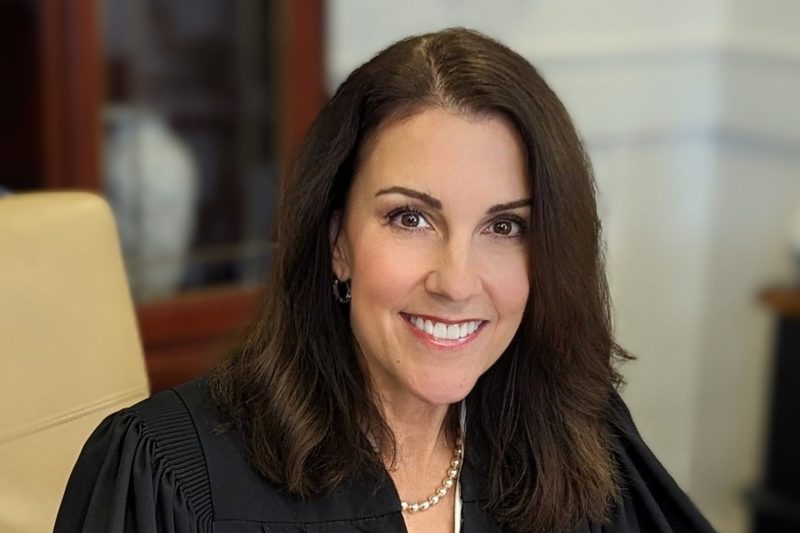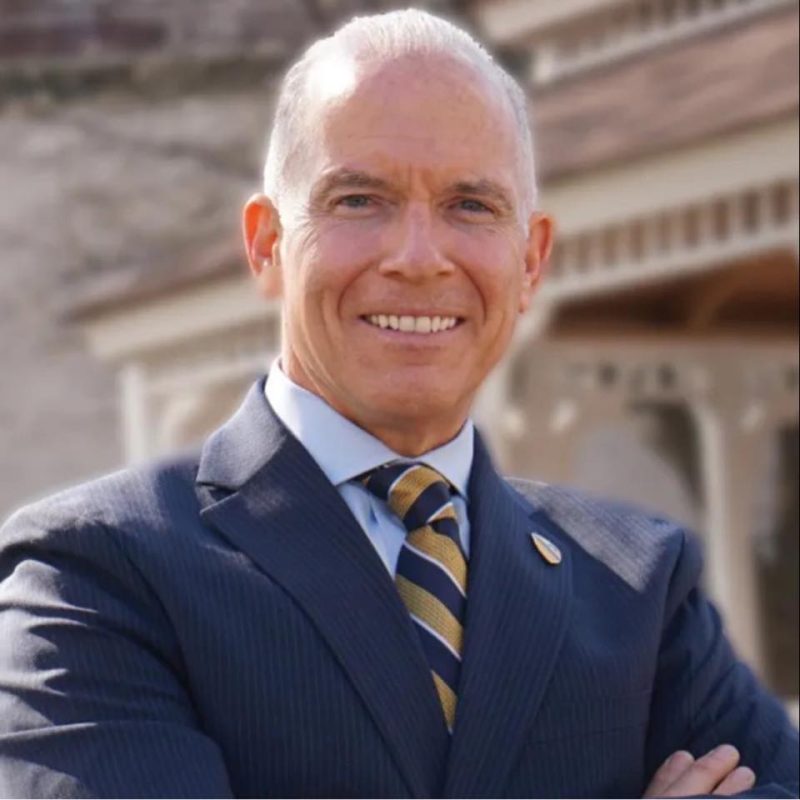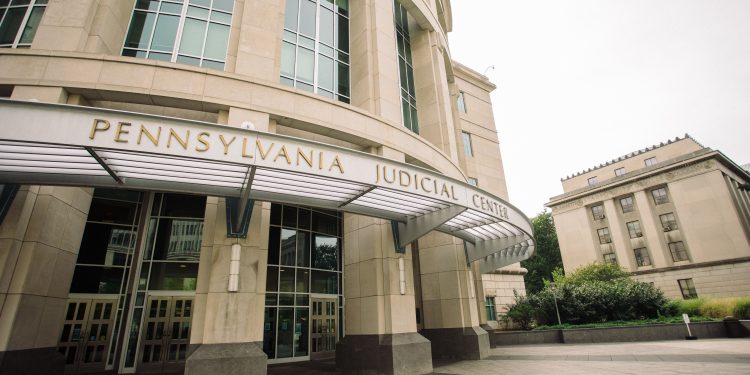During the Nov. 7 election, Democrat Daniel McCaffery and Republican Carolyn Carluccio will compete to fill an open seat on Pennsylvania’s Supreme Court.
Stephen Caruso of Spotlight PA and Kate Huangpu of Spotlight PA
Spotlight PA is an independent, nonpartisan, and nonprofit newsroom producing investigative and public-service journalism that holds the powerful to account and drives positive change in Pennsylvania. Sign up for our free newsletters.
HARRISBURG — During Pennsylvania’s general election on Nov. 7, voters will select the newest state Supreme Court justice.
The winner of the election — Democrat Daniel McCaffery or Republican Carolyn Carluccio — will have considerable power over the interpretation of laws in the commonwealth, and will help determine the balance of the court in coming years.
The state Supreme Court is the final stop for lawsuits in Pennsylvania. Its seven members have the last word on legal questions about everything from election policy to abortion, and also oversee the commonwealth’s other courts and regulate the legal profession, including administering the state bar and disciplining lawyers who violate ethics rules.
In the past, state court races have been competitive but relatively sleepy affairs, with low spending compared to the tens of millions of dollars pumped into gubernatorial races. But that changed in 2015.
Democrats flipped the high court that year, winning three open seats in a race that cost at least $15.8 million. In the years since, that majority has handed down decisions in weighty, politically contentious cases — throwing out a state congressional map and commissioning a new one, allowing a lawsuit challenging state education funding to go to trial, and backstopping Pennsylvania’s no-excuse mail voting law.
With such high-profile issues in front of the court, political operatives in both major parties are paying close attention, and pouring more money into the races. With just one seat up for grabs in 2021, both candidates spent a combined $7.2 million.
This year, the campaigns of the two state Supreme Court candidates spent a combined $900,000 to win their primaries. With the general election not yet in high gear, Carluccio has $260,000 on hand, while McCaffery has more than $495,000.
This year’s race will not change partisan control of the court, which currently has a 4-2 majority of judges elected as Democrats, with one vacancy after the September 2022 death of former Chief Justice Max Baer.
But that majority could fade quickly, said Democratic political operative J.J. Abbott, as all four incumbent Democratic justices will either face retention or reach their mandatory retirement age by 2027.
“Republicans could in theory very quickly take back control of the court and hold it through 2030, giving them control of the redistricting process,” Abbott told Spotlight PA, referencing the redrawing of state legislative and congressional maps that happens once per decade.
Justices serve 10-year terms with no term limits. However, they must retire at age 75. If they reach that age mid-term, they step down and an election to replace them is held in the next odd year. The governor may appoint a replacement to serve in the interim, but two-thirds of the state Senate must approve of the choice.
Candidates

Republican Carolyn Carluccio
Carolyn Carluccio is a judge on the Montgomery County Court of Common Pleas, to which she was first elected in 2009.
Before becoming a judge, Carluccio worked as both a prosecutor and a defender. After a few years in private practice at the start of her career, she became an assistant U.S. attorney in Delaware in 1989 and served in the role for nearly a decade. She then was chief public defender of Montgomery County from 2002 to 2006.
Carluccio also worked as chief deputy solicitor for Montgomery County, handling contract negotiations, real estate matters, and personnel and labor law issues. She also did a stint as the county’s acting director of human resources between 2008 and 2009.
Carluccio was elected unanimously by her peers to serve as president judge of the Montgomery County Court of Common Pleas in 2022.
Endorsements and recommendations: Carluccio is “Highly Recommended” by the Pennsylvania Bar Association, which called her a “highly respected jurist” ahead of this year’s primary.
In her PBA questionnaire, Carluccio wrote that she “wants a justice system that is fair and impartial.” She also called her “diverse court experience” an asset, citing her experience in prosecution and defense as well as in family and civil cases.
Among recent cases that she highlighted in the questionnaire: She ruled in favor of a Montgomery County landowner whose property was partially flooded with runoff from the Pennsylvania Turnpike; sided with a developer who sought an exception to knock down an old mansion and build senior housing; and reinstated a municipal police officer who was fired for providing an evolving excuse for missing work. All three decisions were upheld by appellate courts.
She was the Pennsylvania Republican Party’s endorsed candidate in the primary election, winning the party’s nod in February over Commonwealth Court Judge Patricia McCullough. Carluccio won the primary 54% to 46%.
She is also endorsed by the PA Pro-Life Federation, which opposes abortion access; her campaign has been targeted by ads from abortion provider Planned Parenthood’s political committee.
In statements, Carluccio said that she rejects “judicial activism” and that “women’s reproductive rights are protected by Pennsylvania law.”
“I will uphold that law, and only the Governor and legislature can change it,” she added.
Judicial philosophy and public statements: In a public questionnaire with a Republican-aligned interest group, Carluccio said that former U.S. Supreme Court Justice Antonin Scalia “most reflects [her] judicial philosophy.”
“Justice Scalia’s originalism, embodied by the separation of powers, understanding original intent, and applying the law as written, reflects my judicial philosophy,” she wrote in a survey to the Pennsylvania Coalition for Civil Justice Reform, a nonprofit that primarily advocates for friendlier laws for the health care industry and other business interests in civil cases.
During the primary, Carluccio criticized Pennsylvania’s mail voting law, telling an Erie forum that the no-excuse mail ballots had been “very bad for our commonwealth,” according to the Associated Press.
“I would welcome that to come up before me again, let’s put it that way,” she said.
As for mail voting, she told CBS News her concerns are about “the conflicting, and sometimes unclear, undated ballot decisions” made by the court since 2020.
“I believe our laws must be applied as written, and certainly, our election laws must be applied consistently across all counties, regardless of the election year,” Carluccio said. “And, when part of our electorate has concerns about the integrity of our elections, rather than dismiss their concerns, the response should be bold transparency in the administration of our elections.”
Fundraising: In total, Carluccio has raised just over $800,000 since the start of the primary in 2023, including in-kind donations. Big donors include the political action committees of highly connected Republicans, such as the Commonwealth Leaders Fund — a PAC primarily funded by billionaire school choice advocate Jeffrey Yass — and the PA Future Fund, which is chaired by GOP power broker Bob Asher.
During a forum hosted by nonprofit advocacy group Pennsylvanians for Modern Courts ahead of the primary election, Carluccio said she would not participate in any case that involves one of her campaign donors.

Democrat Daniel McCaffery
Daniel McCaffery was elected in 2019 to Superior Court, the Pennsylvania appellate body that handles all criminal and some civil appeals from the Court of Common Pleas.
McCaffery joined the military at age 18 and was honorably discharged after serving three years. He then attended Temple University for his undergraduate degree and law school.
His older brother is former state Supreme Court Justice Seamus McCaffery, who resigned from the post after a review by the Pennsylvania attorney general’s office found he had sent sexually explicit images and videos to state officials through his government email. Daniel McCaffery, who was then a Common Pleas judge in Philadelphia, was among the recipients.
McCaffery began his professional career at the Philadelphia District Attorney’s office as a prosecutor in the Major Trials Unit in 1991, where he worked for six years. He then joined Montgomery County law firm Friedman Schuman, where he chaired the litigation department and served on its management committee until he joined the Court of Common Pleas in 2013.
McCaffery has a long history in Democratic politics, having volunteered as legal counsel for the Philadelphia Democratic City Committee and been a member of the Pennsylvania Democratic State Committee. That political record lost him an endorsement from the Philadelphia Inquirer during the primary, which backed his opponent and wrote that McCaffery is “enmeshed in party politics.”
He was named in 2014 news reports detailing then-Attorney General Kathleen Kane ending a sting operation that had captured Philadelphia lawmakers illegally accepting money. McCaffery, who like many Democrats had been a Kane supporter, had accepted some of those illegal “straw” donations (in which a person obfuscates their political contributions by donating through other people) during his unsuccessful 2009 bid for Philadelphia district attorney. McCaffery’s campaign returned the checks and reported the incident after discovering the donations were improper.
Endorsements and recommendations: McCaffery is “Highly Recommended” by the Pennsylvania Bar Association, which wrote that he has “sound knowledge of legal principles” and a history of “community involvement.”
In his PBA questionnaire, McCaffery wrote that he aims to “approach every case in a non-partisan manner.”
McCaffery also wrote that his most important decisions include opinions in which he argued that law enforcement officers should be limited when conducting voluntary searches and that a plaintiff should have the right to a trial after she suffered an injury while riding in an Uber despite agreeing to the service’s terms and agreement.
McCaffery was endorsed by the state’s Democratic Party a few months after he announced his candidacy. He won the primary with 60% of the vote against his opponent, Superior Court Judge Deborah Kunselman.
McCaffery also received endorsements from trade organizations such as the Pennsylvania Conference of Teamsters and the Pennsylvania Building and Construction Trades Council.
Judicial philosophy and public statements: In a survey he filled out during his 2019 Superior Court run, McCaffery said U.S. Supreme Court Chief Justice John Roberts represents his judicial philosophy.
At a candidate forum hosted by Pennsylvanians for Modern Courts during the primary, McCaffery said he’s running for state Supreme Court because he believes democratic institutions such as the judiciary are under duress. He said he thinks his decades of service on the bench and unique life experiences make him the best candidate for the position.
“I think our courts right now have been politicized,” McCaffery said at the forum. “It’s a combination of life experience and judicial experience and legal experience that makes me want to run for this particular spot.”
Fundraising: McCaffery has raised just over $800,000 throughout his campaign, and has half of that total currently available on hand. McCaffery’s larger donations come from professional associations and unions such as the PA Judicial PAC, Mid-Atlantic Laborers’ Political League, and Greater PA Carpenters.
Asked about his planned recusal policy as a justice during the PMC forum, McCaffery differed from Carluccio. Rather than pledge to recuse himself from any case involving a donor, he said he would recuse himself from cases with “actual conflict,” and that when an attorney or party asks him to recuse, he plans to “take a look at the allegations of impropriety” and “recuse where necessary.”
BEFORE YOU GO… If you learned something from this article, pay it forward and contribute to Spotlight PA at spotlightpa.org/donate. Spotlight PA is funded by foundations and readers like you who are committed to accountability journalism that gets results.



